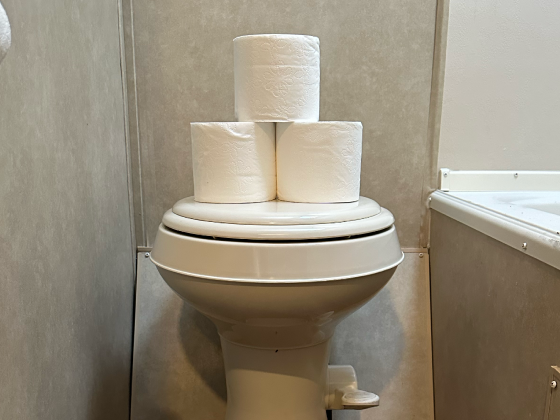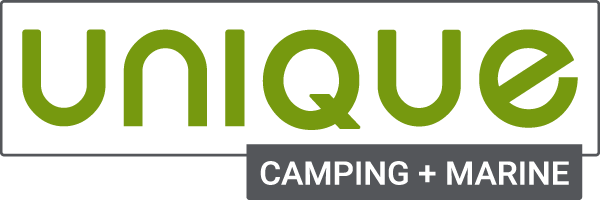As an Amazon Associate, Unique Camping + Marine earns from qualifying purchases.
Key Points:
- Don’t treat your holding tanks like septic tanks because that’s not what they are
- Common tank cleaning techniques like The Geo Method and the ice and driving technique deliver on very little that they promise
- Borax does very little to clean black tanks, even when paired with Dawn Ultra dish soap
- Bleach and other chemical cleaners will not necessarily keep odors and clogs at bay
The advice given by many in the RVing community is usually just information that has been passed along by others who saw results from their technique. However, even though these techniques or products may provide relief for some RVers, you also have to remember that not every RV owner is using their rig the same way. Some are out in nature all day and don’t use their wastewater tanks often; others live in their RV and use them all the time. Some people take care of their tanks regularly; others never treat or clean their tanks. There are so many factors involved in how you use your RV that could affect how successful or unsuccessful these commonly used methods could be.
In this article, we will discuss why you can’t treat your holding tanks as a septic system, some of the most popular tank cleaning techniques and products out there, and why we do or do not recommend them.
RV Wastewater Tanks Are Not Septic Systems
RV wastewater holding tanks are not septic systems. They are just repositories for wastewater to chill until you get a chance to dump the tanks; they shouldn’t be treated as septic systems because septic systems hold more waste and usually have weeks or months to break down and digest solids, fats, oils, and grease. RV holding tanks usually only hold waste for maybe a week, which has led some people to believe that you don’t need to treat your tanks because any costly treatments you put in the tank will just be dumped a few days later (a claim that we will diffuse in the following section). To be honest, the short stay of the waste in the holding tanks is actually more reason to use tank treatments precisely because it does not have weeks or months to break down like in septic systems; you want breakdown happening as quickly as possible so that odors and clogs do not become a problem when you’re enjoying your RV or trying to dump. In the next section we will discuss some of the advice we see being shared in the RV community and reasons why these methods will not render the desired results.
The most common advice we see people give other RVers are:
- Not treating your tanks with anything
- The Geo Method
- Just Borax or Borax combined with Dawn Ultra Dish Soap
- The Ice and Driving Technique
- Bleach and Other Chemical Cleaners
Let’s discuss the reasons why some of these tank cleaning techniques probably won’t deliver the cleaning power you want.
Not Treating Your Tanks with Anything
So if an RV wastewater holding tank is just a temporary container for dirty water, why is it necessary to treat it with anything? You’re going to dump it out anyway in a few days. This reasoning might seem logical, but not treating your black and gray/galley tanks with any sort of treatment is a recipe for odors and other problems. Every time you use your RV toilet, anaerobic bacteria from your stomach is added to your tank. This bacteria breaks down solid waste (which is a good thing), but it also releases stinky odors while it does this. If you don’t treat your tank with anything, these bacteria will continue to release odors that could creep into your living space. Even your gray or galley tanks can benefit from some sort of tank treatment to prevent grease and oils from coating the sensors and causing misreads.
It’s better to handle this problem by adding non-smelly bacteria by way of a bacteria and enzyme treatment (like Unique RV Digest-It Plus), but if you still want to stay away from using any products, the next best thing to do is make sure your black tank(s) always has ample amounts of water. Water is a natural odor suppressant and also softens the waste so it can remain below the water line. We do not recommend not treating your tanks, but if that’s the option you choose, be sure to employ the right care habits.
Note: Refer to The Unique Method guide for lots of great tips on healthy care habits that will bring you some level of success even without using treatment products.
The Geo Method
The Geo Method is one of the most popular tank cleaning techniques passed around the RVing community. However, we’ve thoroughly analyzed The Geo Method from a scientific perspective and reject the idea that its chemical combo is able to effectively and comprehensively clean or loosen waste; we always prefer to lean on consistently effective, scientifically-based solutions that we can biologically explain. The chemicals used in this method will also kill bacteria inside your tank, so if you intend to use bacteria and enzyme treatments in your tank, we do not recommend using The Geo Method.
The Geo Method claims to clean tanks using a combination of a water softening product called Calgon and surfactants like dish soaps or laundry detergents. Surfactant is just a fancy way of saying soap, and they are often used to clean the inside of RV holding tanks. Softened water allows surfactants to work better, meaning it will foam up and be more efficient at cleaning the buildup you are targeting. Allegedly, the Calgon coats the walls of the tank, making them slick so that debris and residue that normally sticks to the walls slides right off, but testing and analysis does not confirm that this is the case. Calgon doesn’t “coat” much of anything but instead probably just changes the chemistry of the water, preventing calcium buildup on a microscopic level, and since you’re not trying to prevent calcium buildup in your black tank, it doesn’t seem like Calgon will do much to dislodge already built-up waste residue.
The Geo Method is one of the most popular cleaning techniques in the RVing world, but the process isn't proven, and most frustrated RVers we talk to report that they've tried this technique many times without achieving the desired results. You may need to play around with measurements and ratios until you achieve the result you want, but the truth is, it’s possible you may not be able to achieve a clean tank with this method.
Note: For more details on the merits and pitfalls of this technique, refer to The Geo Method guide.
Borax Alone or Borax with Dawn Ultra Dish Soap
Sodium Tetraborate (Borax) is a mineral that has been used as a cleaning product for years. It can get rid of stains and mold, kill bugs, neutralize odors, soften hard water, and is used in detergents and other cleaning products. Typically, it removes stains and odors best when applied to carpets or fabrics, but there is no evidence it can do the same for RV wastewater tanks. It is considered a chelating agent, which is a chemical structure that bonds with metal ions, making them soluble; basically small amounts of metal can be carried away by water. But metal is not what you’re trying to remove from your tanks, so why would this help clean black tanks? Borax has some cleaning power and can soften water, which is a similar chemical combination to the Geo Method but in one product. The problem is a similar one to The Geo Method: water softening products supposedly make the walls slick to help debris slide off, but there’s no evidence that residue already stuck to the walls will be loosened or that walls will be “coated” to prevent waste from adhering. As we mentioned when explaining the Geo Method, tests and analysis cannot confirm that Borax alone will deliver the desired results. Even combining it with Dawn Ultra will not necessarily enhance the cleaning power. And adding Borax, whether Dawn Ultra is present or not, will kill any bacteria in the tank, which means any waste breakdown that was happening will cease with the demise of the bacteria colonies.
Dawn Ultra dish soap is a fantastic grease-eater and we often recommend it for deep cleaning your RV gray tanks, but pairing it with Borax to clean black tanks may be a waste of money and cleaning products. Grease-eating products will have basically no cleaning or breakdown effect on human waste and toilet paper. There shouldn’t be much grease in your black tanks, unless you’re dumping food waste down the toilet, which is why Dawn Ultra will probably not contribute much to your cleaning efforts. There may be a miniscule amount of grease from the waste breakdown process, but not enough to necessitate the addition of Dawn Ultra. A common misconception is that Dawn Ultra is antibacterial (if bacteria elimination is what you’re going for); it will not kill bacteria, and if you do, you’re actually creating a barrier to waste breakdown. There is no real evidence to suggest that using one of these two products or both together will effectively clean the waste in black tanks, especially if a deep cleaning has rarely been performed and there is a lot of caked waste that you are trying to loosen.
Dawn Ultra is a retail dish soap that touches skin in millions of kitchens every day without problems, but exposure to or inhalation of Borax can cause rashes, infection, vomiting, eye irritation, nausea, and respiratory problems, so you may want to consider other cleaning options that may be less harmful if exposed.
The Ice and Driving Technique
The ice and driving technique has been around for a while. The basic idea is that you put a certain amount of ice and a small amount of water and detergent/dish soap in your tank and then drive around for a few hours to let the mixture slosh around in the tank. The ice is meant to be a scouring agent for the walls of the tank and the detergent offers additional cleaning assistance. Proponents of this technique say you have to be very specific about how much ice and water you use; too much water and the ice will simply float around and not provide scouring power. Not enough water will cause the ice to freeze into a mass (depending on tank temperatures) and won’t be loose and free to scour the walls.
This option sounds nice enough, but you still have to drive like a maniac for the ice and detergent solution to even reach the top part of the tank. Normal, responsible driving just doesn’t provide enough jolt to move the ice and soap high enough to clean the upper portion of the tank. And when you think about it, it doesn't make much sense anyway; cleaning dirt off of something usually works better with hot soapy water, not ice cold water. You may see better results by filling your tank with hot water and detergent and driving around, but from our experience with customers who have tried this technique, they report it is pointless, unsuccessful, and a waste of time and money.
Bleach and Other Chemical Cleaners
People often ask if we recommend using bleach to clean out their wastewater holding tanks. That’s a triple no. We strongly encourage you to stay away from using bleach, Pine-Sol, and other chemical cleaners in your wastewater tanks because ironically, they actually make things worse when it comes to preventing odors. If you decide to use bacteria and enzyme treatments in your tanks, deep cleaning with bleach or Pine-Sol will kill all the good bacteria that had accumulated in your tanks, meaning you’ll need to buy more products to build back the bacteria colonies that were destroyed by the chemicals. In addition, bleach and other corrosive chemical cleaners have the potential to damage the tank and the valves and even eat away at the rubber seals. However, bleach does a great job sanitizing your freshwater tank to ensure that your tap water is clean and free from bacteria.
Note: The Unique Method explains more about why it’s best to avoid chemical cleaners in your wastewater tanks.
Review
It’s always nice to get advice from someone who’s been RVing longer than you, but beware because even many seasoned pros recommend these techniques, which may have worked for them, but the majority of our customers who try these methods report they do not deliver on their promises. The Unique Method will produce the odor-free and clog-free results you want and in a less expensive and less time-consuming way. Let’s briefly review what we’ve discussed in this guide:
- RV wastewater holding tanks are not septic tanks; don’t treat them like septic tanks
- Not treating your tanks with anything is a recipe for odors and clogs
- The Geo Method is the most popular tank cleaning technique, but our scientific research shows that it does very little to clean and prevent buildup
- Borax does very little to clean black tanks, even when paired with Dawn Ultra dish soap
- The ice and driving technique is a waste of time and energy
- Bleach and other chemical cleaners will kill the bacteria that break down the waste, can potentially worsen odors, and they could even damage tanks, seals, and valves.

Prevent Common Problems In Your Tanks!
From misreading sensors, preventing clogs, or eliminating odors, we've got you covered no matter how you camp! All our best holding tank tips and trick information plus more can be found conveniently in one place when you download our FREE Unique Method Field Guide. Achieve holding tank bliss today!
Get The Free Download



